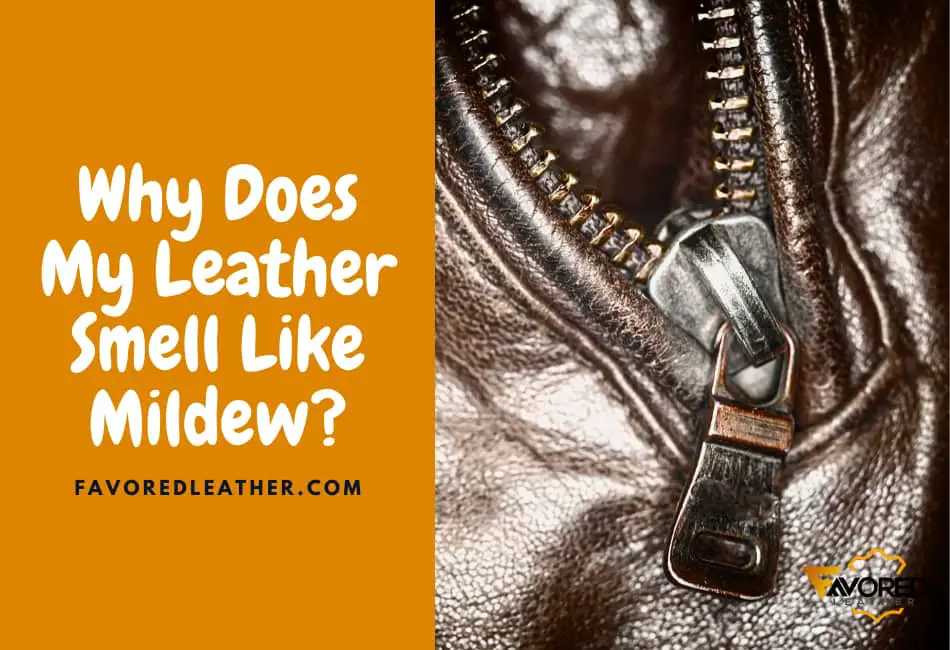I’m known as the leather guy! That guy who’s perceived – knows everything about both real and faux leather. Because of this, I get a lot of funny questions related to leather.
Over the weekend, my brother-in-law asked me what seemed like a funny question at the time, but upon further reflection, I realized it was a very good question that many people probably have but are too embarrassed to ask.
The short answer I gave him was that leather that is stored in damp places, wooden closets, bathrooms, basements, or wrapped with newspaper or brown paper could develop a mildew smell.
I promised him I would do an in-depth article on the subject, so here it is! But before I get into the other reasons why leather may smell like mildew, let’s take a few minutes to be clear on what the smell of mildew is so that we are on the same page in diagnosing the issue.
What Is The Smell Of Mildew?
Mildew is a type of fungus that thrives in warm, humid environments and on organic materials like leather. The spores of mildew are always present in the air around us and only need the right conditions to start growing.
These conditions include warmth (between 77-86 degrees Fahrenheit), lack of sunlight, and, most importantly, moisture. There are about two to three main characteristics to the smell of mildew that you should be able to identify.
- Mildew Has A Musty Smell
The first is a musty smell that is often compared to the smell of damp laundry that has been left in the washing machine for too long. This is a smell most people can identify quite easily.
- Mildew Smells Like Mold
The second characteristic is that mildew smells like mold. This shouldn’t be surprising since they are both types of fungi. The smell of mold is often described as being earthy, damp, or musty.
- Mildew Smells Like Rotting Wood
Another smell commonly associated with the smell of mildew is the smell of rotting wood. This is because mildew often grows on wood that has been damp for too long and is starting to rot.
- Mildew Smell Is Described As Stale
The smell of mildew is also often described as being stale. This is likely because the spores that cause mildew to form are usually found in moist, humid environments.
When these spores come into contact with leather, they can cause the leather to smell musty or stale. In some cases, the mildew smell may also be accompanied by other odors, such as a sour smell.
- Mildew Has A Paper-Like Smell
Many others would also describe the smell of mildew on leather as being paper-like. When mildew first begins to form, it will have a musty smell that is very similar to the smell of paper or damp paper. If you have ever left a leather item in a humid environment for too long, then you know exactly what this smells like.
- Dirty Wet Socks
Last but not least, another common smell associated with mildew, especially by kids, is that of dirty wet socks for all the wrong reasons.
So if your leather has any of the above smells, then chances are you have a mildew smell on your leather item.
Reasons Why Leather Smell Like Mildew
Now that we’re clear on how mildew smells, especially on leather, here are the reasons why your leather may have picked up the mildew smell:
1. The Leather May Actually Have Mold Or Mildew
Not to sound like captain obvious, but the number one reason your leather smells like mildew is that it has mold or mildew growing on it.
As mentioned, mold and mildew thrive in warm, humid environments and love organic materials like leather.
If you have a leather item that has been stored in a damp basement or garage, then it’s very likely that mold or mildew has started to grow on it.
The same is true for leather items that have been left in a car or RV that is not well ventilated.
The lack of air circulation combined with the warmth and moisture creates the perfect environment for mold and mildew to grow.
The presence of the mold or mildew can then lead to the musty, paper-like, or dirty wet sock smell that is often associated with mildew.
2. Storing The Leather In A Damp Place
If you store your leather items in a damp place, then it’s likely that they will pick up the mildew smell from the environment.
This is especially true if the leather is stored on the floor or in a storage unit that is not well ventilated.
The lack of air circulation combined with the dampness of the environment will cause the leather to absorb the moisture and start to smell musty.
One way to prevent this is to store your leather in a breathable bag or box. This will allow the leather to breathe and prevent it from absorbing the moisture in the air.
You can also try using a dehumidifier to help remove the moisture from the air and keep your leather smelling fresh.
If you live in a particularly humid climate, you may need extra care to prevent your leather from mildewing.
3. Leather May Have Been Stored In A Plastic Bag
If you also have your leather items stored in air-tight plastic bags, then it’s also likely that they will develop a mildew smell.
This is because the plastic bag will trap the moisture and cause the leather to sweat. The trapped moisture will then provide the perfect environment for mold and mildew to grow.
To prevent this from happening, store your leather in a breathable bag or box.
I have developed a habit of storing my wife’s leather bags and our shoes on shelves like these – which you can find on Amazon.
These shelves allow the leather to breathe and prevent them from developing musty smells.
4. Not Properly Drying Leather Items After Cleaning
If you don’t properly dry your leather items after cleaning them, they may also develop a mildew smell.
This is because the dampness of the leather provides the perfect environment for mold and mildew to grow.
To prevent this from happening, always thoroughly dry your leather items after cleaning them.
You can either let them air dry or use a hairdryer on the low setting to speed up the process.
5. Not Cleaning Leather Properly
This is, in fact, a no-brainer. If you don’t clean your leather regularly, it will start to stink.
While some of these smells will be similar to mildew or mold, others will simply be nauseatingly pungent.
The good news is that this one is easy to fix: start cleaning your leather regularly.
Products like saddle soap, leather milk, and coconut oil can all be used to clean your leather.
Just read the instructions on how to use them so as not to damage your furniture properly.
And once you’ve cleaned it, be sure to condition the leather, so it doesn’t dry out and crack.
How To Remove Mildew Smells From Leather
Any of the above reasons can cause your leather to develop a mildew smell on your leather items, whether it’s a leather sofa, car seats, bags, or shoes, to mention a few.
The good news is that you can do a few things to remove the mildew smell from your leather. Below are some of the most effective methods for eliminating mildew smells:
Method #1: Using Baking Soda To Remove The Smell Of Mold Or Mildew
Baking soda is a natural odor absorber that will help remove the musty mildew or mold smell from your leather.
If you’re looking for a non-invasive way to remove the smell, then this is the method for you. To use baking soda;
- Step One: Simply sprinkle it on the affected area and let it sit for a few hours.
- Step Two: Once the time is up, vacuum up the baking soda and enjoy your fresh-smelling leather.
Method #2: Using Mild Dish Soap To Remove The Smell Of Mold Or Mildew
If the baking soda method doesn’t seem to be doing the trick, then you can try using mild dish soap.
This method is a little more invasive but will definitely remove the musty mold or mildew smell from your leather. To use mild dish soap;
- Step One: Create a mixture of one part dish soap and two parts water.
- Step Two: Using a clean cloth, apply the soapy lather of the mild dish soap solution to the affected area and scrub in a circular motion.
- Step Three: Once you’ve scrubbed the entire area, use a damp cloth to remove any soap residue.
- Step Four: Use a dry clean cloth to remove any excess moisture or water from the leather surface.
- Step Five: Finally, apply your usual leather conditioner to the surface to keep it from drying out.
Method #3: Using Vinegar To Remove The Smell Of Mold Or Mildew
Vinegar is another natural odor absorber that can be used to clean and remove the musty mildew or mold smell from your leather.
Vinegar is made up of water and acetic acid and is a natural disinfectant that can be used around the home. To use vinegar to remove the mildew or mold smell from your leather;
- Step One: Mix one part vinegar with one part water in a bowl.
- Step Two: Dip a clean cloth into the mixture and wring it out so it’s damp but not dripping wet.
- Step Three: Rub the cloth over the affected areas of your leather in a circular motion.
- Step Four: Allow the vinegar solution to sit on the surface of the leather for about 3-5 minutes before wiping it off with a clean damp cloth.
Repeat this process as necessary until the musty smell is gone and your leather smells fresh and clean.
Tips On How To Prevent Mold And Mildew Smells From Leather
Now that you know how to remove the musty smell of mold or mildew from your leather, it’s time to learn how to prevent it from happening in the first place.
Here are a few tips on how to keep your leather smelling fresh and clean:
- First, always store your leather items in a cool and dry place.
- Avoid storing your leather items in plastic bags as this can cause the leather to sweat and develop mold or mildew.
- If your leather item does get wet, be sure to dry it off as soon as possible.
- Use a good quality leather conditioner on your leather items regularly to keep them from drying out and cracking.
- Finally, avoid exposure to direct sunlight as this can cause the leather to fade and dry out.
Following these simple tips can help prevent your leather from developing musty mildew or mold smell.
Final Thoughts
So there you have it! Five possible reasons why your leather smells like mildew and three possible solutions to get rid of the musty smell.
If you’re still having trouble getting rid of the smell, you may need to purchase a good leather cleaner or take your item to a professional for cleaning.
Thanks for reading, and I hope this article was helpful. Until next time!

